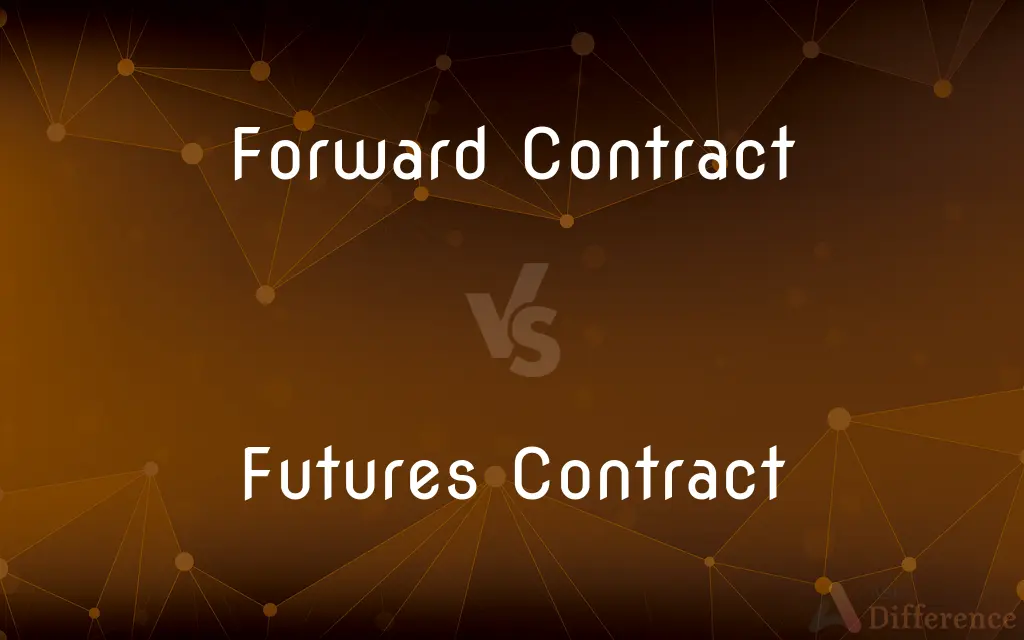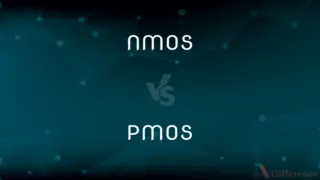Forward Contract vs. Futures Contract — What's the Difference?
Edited by Tayyaba Rehman — By Fiza Rafique — Published on December 15, 2023
A Forward Contract is a private agreement between two parties, whereas a Futures Contract is a standardized contract traded on exchanges.

Difference Between Forward Contract and Futures Contract
Table of Contents
ADVERTISEMENT
Key Differences
Within the realm of finance, Forward Contract and Futures Contract are two instruments for hedging or speculating on price movements. A Forward Contract is a private, customized agreement between two parties to buy or sell an asset at a specified price on a future date. It's directly arranged between the parties and thus, provides flexibility in its terms.
Conversely, a Futures Contract represents a standardized agreement to buy or sell a particular asset, like commodities or financial instruments, at a predetermined price and time. Unlike the Forward Contract, Futures Contract is traded on organized exchanges. This trading on exchanges means they come with standardized terms, such as contract size and expiration date.
One notable distinction between Forward Contract and Futures Contract is the issue of counterparty risk. In Forward Contracts, since they are private and over-the-counter, there's a higher risk of one party defaulting. On the other hand, in the case of Futures Contracts, the exchange acts as an intermediary and guarantees the trade, substantially reducing the counterparty risk.
Liquidity is another area of contrast. Futures Contracts, being exchange-traded, typically offer higher liquidity than Forward Contracts. This liquidity in Futures Contracts makes them more accessible to individual investors. In summary, while both Forward Contract and Futures Contract serve similar purposes, their structure, trading environment, and risk profile set them apart.
Comparison Chart
Nature
Private, customized agreement.
Standardized, exchange-traded agreement.
ADVERTISEMENT
Counterparty Risk
Higher, due to over-the-counter nature.
Lower, as exchanges guarantee the trade.
Liquidity
Generally lower.
Typically higher due to exchange trading.
Accessibility to Individual Investors
Less accessible due to customization.
More accessible, given its standard nature.
Contract Specifications
Flexible terms set by parties.
Standardized terms set by the exchange.
Compare with Definitions
Forward Contract
Forward Contract allows for customized terms.
The two manufacturers agreed on a unique delivery date through a Forward Contract.
Futures Contract
Futures Contract has reduced counterparty risk.
The exchange guaranteed the delivery and payment of the Futures Contract.
Forward Contract
Forward Contract is typically not traded on exchanges.
The financial institution used a Forward Contract to mitigate currency risk.
Futures Contract
Futures Contract is accessible to individual and institutional investors.
With a small margin, Mark entered into a Futures Contract betting on stock indices.
Forward Contract
Forward Contract is a private agreement between two entities.
Company A entered into a Forward Contract with Company B to buy oil at a set price.
Futures Contract
Futures Contract offers higher liquidity.
Due to its tradability, the Futures Contract could be sold quickly.
Forward Contract
Forward Contract is directly arranged between the parties.
The two corporations set up a Forward Contract to secure their investment.
Futures Contract
Futures Contract is a standardized agreement traded on organized exchanges.
Jane bought a gold Futures Contract on the commodities exchange.
Forward Contract
Forward Contract carries higher counterparty risk.
Due to the lack of a middleman, the Forward Contract had no guarantee.
Futures Contract
Futures Contract comes with set terms like contract size and expiration.
The trader chose a Futures Contract with a December expiration.
Common Curiosities
Do Futures Contracts carry a default risk?
Futures Contracts have reduced counterparty risk because exchanges act as intermediaries and guarantee trades.
How is a Futures Contract different from a Forward Contract?
A Futures Contract is a standardized, exchange-traded contract, whereas a Forward Contract is private and customized.
Can individual investors access Forward Contracts?
Forward Contracts are less accessible to individual investors due to their customized nature.
Are the terms of a Forward Contract fixed?
No, the terms of a Forward Contract are flexible and agreed upon by the parties involved.
Where are Futures Contracts traded?
Futures Contracts are traded on organized commodity and financial exchanges.
What are the risks associated with Forward Contracts?
Forward Contracts carry higher counterparty risk since they are private agreements without exchange backing.
Which has higher liquidity, Forward Contract or Futures Contract?
Futures Contract typically offers higher liquidity as it's traded on exchanges.
Are Futures Contracts always standardized?
Yes, Futures Contracts are standardized with set terms dictated by the exchange they are traded on.
What is a Forward Contract?
A Forward Contract is a private, customized agreement between two parties to buy or sell an asset at a future date.
Why are Futures Contracts popular among traders?
Futures Contracts are popular due to their liquidity, reduced risk, and ability to speculate or hedge on price movements.
Can you provide an example of a Forward Contract?
A tech company might enter a Forward Contract to buy a specific amount of rare metals at a set price six months from now.
Is it possible for a Forward Contract to be traded on exchanges?
Typically, no. Forward Contracts are over-the-counter agreements and not exchange-traded.
Can Forward Contracts be tailored to specific needs?
Yes, Forward Contracts can be customized to fit the specific requirements of the parties involved.
Why would someone opt for a Futures Contract over a Forward Contract?
Someone might choose a Futures Contract for its liquidity, reduced counterparty risk, and standardization.
Can a company hedge its risks using a Forward Contract?
Yes, companies often use Forward Contracts to lock in prices and hedge against potential adverse market movements.
Share Your Discovery

Previous Comparison
Maybe vs. May be
Next Comparison
NMOS vs. PMOSAuthor Spotlight
Written by
Fiza RafiqueFiza Rafique is a skilled content writer at AskDifference.com, where she meticulously refines and enhances written pieces. Drawing from her vast editorial expertise, Fiza ensures clarity, accuracy, and precision in every article. Passionate about language, she continually seeks to elevate the quality of content for readers worldwide.
Edited by
Tayyaba RehmanTayyaba Rehman is a distinguished writer, currently serving as a primary contributor to askdifference.com. As a researcher in semantics and etymology, Tayyaba's passion for the complexity of languages and their distinctions has found a perfect home on the platform. Tayyaba delves into the intricacies of language, distinguishing between commonly confused words and phrases, thereby providing clarity for readers worldwide.












































